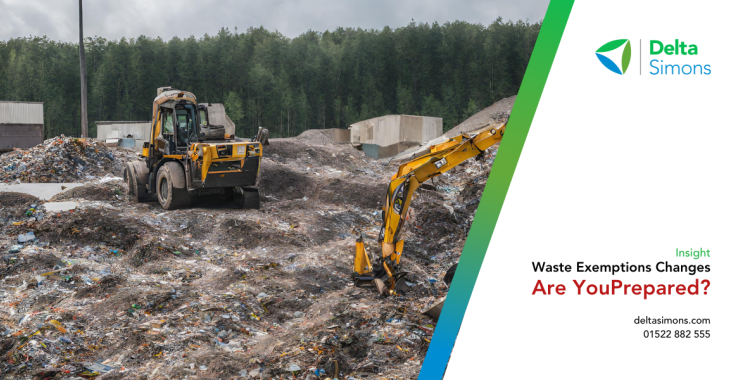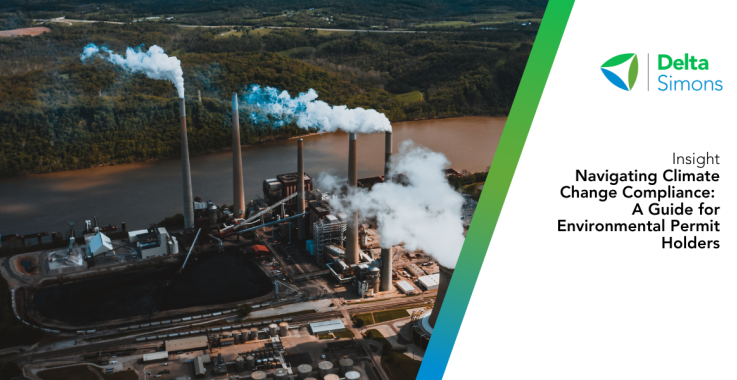Whole Life Cycle Carbon Assessment: Assessing Emissions From Cradle To Grave
01 Dec 2022
Carbon management
Environment
Sustainability
Environmental Social Governance (ESG)
The UK presently has a legally binding net-zero carbon target that commits us to the Paris Agreement and sets out our policies for decarbonising all sectors of the economy by 2050. The Agreement aims to limit global warming to 1.5oC above pre-industrial levels. To achieve this global emissions will need to be halved by 2030.
Delta-Simons Principal Sustainability Consultant Robert Dadzie outlines the importance of conducting Whole Life Cycle Carbon Assessments.
Whole Life Cycle Carbon Assessment: Assessing Emissions From Cradle To Grave
In order for the built environment to achieve net zero carbon by 2050, as outlined by the Paris Agreement, a focus on both operational emissions and embodied carbon is required. Otherwise, by 2060 our urban spaces will have doubled in size, contributing to over 200 gigatons of embedded carbon emissions globally from new construction, renovation and necessary infrastructure improvements.
Why is this a problem?
For a start, our buildings already consume 50% of the world’s natural resources through the extraction of materials. In addition to this, energy-related carbon emissions from the global building stock, which dipped during the Covid-19 pandemic, are projected to rebound in the years to come, as normal activity resumes within the service industry.
Already buildings are responsible for around 39% of global carbon emissions. Whilst 28% of these emissions are associated with operational energy use, an increasing amount results from the embodied energies associated with construction and materials.
Understanding emissions relating to your product or building design can be a difficult task. With vast quantities of materials involved in procurement, the carbon footprint associated with supply, transport, manufacture and construction can be significant. Nonetheless, as levels of construction double across the next three decades, it is anticipated that emissions from embodied carbon will equal emissions from operational activities.
Whole Life Carbon
Conducting a Life Cycle Assessment (LCA) encourages a holistic calculation of consumption across the various stages of a project design and provides for a fuller account of emissions.
Whole life thinking involves considering all life cycle stages of a project, from raw material extraction, product manufacturing, transport and installation on site through to the operation, maintenance and eventual material disposal (RICS, 2018).
A thorough LCA not only allows a design team to understand the emissions associated with a building’s operational stage, but it also promotes the calculation of embodied emissions and supports a circular economy.
A Whole Life Carbon LCA considers cradle-to-grave emissions, from extraction right through to the use stage and eventual decommissioning. It can also promote cradle-to-cradle thinking by encouraging resource efficiency through designs for reuse, durability and adaptability.
World Green Building Council Net Zero Carbon Building Commitment
The World Green Building Council (WGBC) is a global network of over 70 Green Building Councils across the globe. They are on a mission to transform the building and construction sector across three strategic areas—climate action, health & well-being, and resources & circularity.
As members of the UN Global Compact, the WGBC work with businesses, organisations and governments to drive the ambitions of the Paris Agreement and UN Global Goals for Sustainable Development. Their main targets are;
- By 2030 – To achieve a 40% reduction in embodied carbon from all new builds, infrastructure and renovation projects.
- By 2050 – To achieve Net Zero embodied carbon.
UK Green Building Council Carbon Reduction Hierarchy
The UK Green Building Council (UKGBC) is part of the WGBC. As outlined in the UKGBC’s 2022-2025 Strategy, they aim to support the UK built environment industry’s transformation to net zero carbon in climate-resilient built assets, whilst maximising environmental net gain. Their main targets are;
- 50% Reduction in operational carbon from new and existing domestic buildings.
- 30% Reduction in embodied carbon from new homes
- 70% Reduction in operational carbon from new and existing non-domestic buildings.
- 75% Reduction in operational carbon from new and existing infrastructure assets.
- 20% Reduction in embodied carbon of new infrastructure assets.
There are several steps for achieving Net Zero in building design outlined in the UKGBC Net Zero Carbon Buildings Framework:
- Set a Net Zero Carbon Scope for Construction and Operational emissions;
- Actively work to reduce your construction impacts, through a Whole Life Carbon Assessment;
- Promote Operational Energy Efficiency by prioritising a reduction in demand and through regular public disclosure;
- Increase investment into on-site renewables or Power Purchase Agreements (PPAs) with an off-site provider; and
- Offset residual carbon emissions using a verified framework.
The UKGBC framework acts as the industry standard for Net Zero design in construction and challenges developers to address one of the core environmental issues facing the building industry. Organisations can demonstrate positive leadership by signing up for the UKGBC Net Zero Carbon Building Commitment and other wider initiatives put forth by the WGBC and its members.
Whilst there are currently no regulations regarding net zero in building design, the WGBC, UKGBC and RICS have published a number of guidance documents on embodied carbon detailing best practices, and whole life-span approaches for both new build and retrofit/redevelopment projects.
To Retrofit, Or To Not Retrofit
As detailed by the BSRIA and London South Bank University (LSBU) in their latest publication, Net Zero Carbon Buildings NZG 1/2022, retrospective fitting of net zero is more costly and complex than planning for net zero commitments during the planning stages of a new build.
“Building professionals have a responsibility to avoid design solutions today that create problems tomorrow. All new buildings should target net zero designs from the outset. A net zero design should aim to minimise energy use using a fabric first approach and avoid the need for fossil fuel use on site.” Dr Aaron Gillich, NZG 1/2022.
From fossil-fueled gas boilers to considered operation, it is essential for planners and developers to plan for future cost impacts of not investing in low-carbon options for new buildings.
Solutions
As a Principal Sustainability Consultant, I would recommend taking the following actions in order to progress towards your Net Zero Carbon Commitment.
Construction-Based Emissions
- Conduct a Whole Life carbon assessment during concept design to maximise potential benefits;
- Include at a minimum substructures and superstructures;
- Embed modern methods of construction into design to achieve a compact, lightweight, durable and adaptable structure, which utilises minimal resources;
- Design out waste and promote circular economies;
- Where possible retain existing features and landscape;
- Promote the use of recycled content and responsibly sourced materials;
- Implement a local procurement strategy to reduce transport emissions and to support local economies.
Operation Based Emissions
- Reduce operational energy demand through passive design features i.e. natural lighting and ventilation;
- Invest in renewables and energy-efficient heating, ventilation and lighting systems;
- Carry out an energy audit and develop an energy management system;
- Determine the number of offsets required following construction or in operations to achieve Net Zero emissions.
Our approach to Whole Life Carbon Assessment
At Delta-Simons our approach is based on the 2017 RICS methodology for building LCA (due for revision in 2022). The RICS Professional Statement assesses life cycle modules from product stage through to eventual disposal or reuse & recycling. Our carbon assessments are also undertaken in general accordance with PAS 2050:2001 specification for LCA emissions of goods and services and the ‘Greenhouse Gas (GHG) Protocol’.
In reviewing existing Client data our assessments include all mandatory Scope 1 (directly combustible fuels) and Scope 2 (purchased electricity) emissions sources; as well as all material Scope 3 emissions, as identified.
Carbon conversion factors are taken from ‘UK Government GHG Conversion Factors for Company Reporting’, ‘International Energy Agency’ and other relevant sources, as appropriate. Where necessary, carbon neutrality is demonstrated in accordance with ‘PAS2060 – Carbon Neutrality’.
Our Core Sustainability Services
Our Sustainability Team has extensive experience in undertaking carbon assessments for a wide range of projects, including residential, commercial, education, industrial and highways-related developments. Some of our core deliverables include;
- Carbon Footprint Assessment
- Net Zero Planning
- Energy Efficiency Reporting
- SECR & ESOS Compliance
- Sustainability Statements
Engaging with a nationally (and internationally) trusted provider of sustainability services will help you to take control of your carbon emissions, reduce planning risks, and identify challenges relating to your development and current Assets Under Management (AUMs).
For further information about our Sustainability services, please contact Robert Dadzie and our Sustainability Team by emailing info@deltasimons.com.
About The Author
E: robert.dadzie@deltasimons.com






